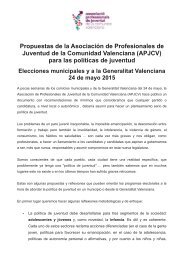c39dc
c39dc
c39dc
You also want an ePaper? Increase the reach of your titles
YUMPU automatically turns print PDFs into web optimized ePapers that Google loves.
3.2.2 Review of sources<br />
A review of sources (extant literature and employer surveys on skills<br />
issues) was undertaken to obtain an up to date view of existing<br />
research, in particular in relation to RQ1, R2 and RQ4 –see Table<br />
3.1- for which the study team undertook less intensive primary data<br />
collection and for which there are a number of secondary sources<br />
available. The literature review was undertaken through Boolean<br />
searches 80 in educational databases and encompassed academic<br />
publications and grey literature (in particular reports from<br />
international and youth organisations). Literature written in English<br />
and international surveys were reviewed, in order to keep the<br />
literature review manageable. This created a certain bias towards the<br />
experience of the UK and USA. The literature search, however, was<br />
not circumscribed to a particular geographic focus and aimed to<br />
gather data on the experience of other countries whenever available<br />
in English language.<br />
Regarding RQ1, related to the nature of the skills demanded by<br />
employers, information on these from a comparative perspective<br />
does not disaggregate information by level of education. Most<br />
available information refers to skills demanded from graduates.<br />
There is less information regarding other groups; however, available<br />
information suggests that there is a certain degree of overlap<br />
between the soft skills demanded by employers from graduates and<br />
non-graduates, as detailed in the body of this report. For RQ1 a<br />
number of major surveys on the skills demanded by employers were<br />
reviewed. These are listed in Annex 1.<br />
Regarding RQ2 it should be noted that there are very few studies<br />
that focus systematically on skills development in the youth sector<br />
and even fewer that particularly look at the development of soft skills<br />
in this field. In this respect, it is interesting to note, for instance, that<br />
the final external evaluation of the Youth in Action programme 2000-<br />
2006 (ECORYS 2007 81 ) focused only on the citizenship<br />
competences acquired by young people through their participation in<br />
the programme (and its impact on their attitudes, skills and<br />
knowledge in that respect) and not on the development of soft skills.<br />
Several studies have provided important insights on the relationship<br />
between youth work and education/ learning. Ord discusses<br />
curriculum aspects (2004 82 ) and experiential learning (2009 83 ) in<br />
youth work, Giroux (2005 84 ) analyses ‘youth work as a border<br />
80These are searches which enable combination of words through the use of Boolean operators such as ‘and’, ‘or’,<br />
‘not’ when searching by keywords or sentences, which enable more targeted searches to be performed.<br />
81 ECORYS (2007) Final external evaluation of the Youth Community Action programme 2000-2006. Final report.<br />
ECORYS Nl, Rotterdam.<br />
82 Ord, J. (2004) ‘The Youth Curriculum as a process, not as outcome and output to aid accountability’ Youth and<br />
Policy, num.85, pp.53-69.<br />
83 Ord, J. (2009) ‘Experiential learning in youth work in the UK: a return to Dewey’ International Journal of Lifelong<br />
Education, vol.28(4), pp. 493-511.<br />
84 Giroux, H. (2005) Border crossing. Oxon, Routledge.<br />
30




